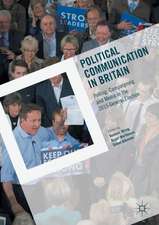Issue Voting and Party Competition: The Impact of Cleavage Lines on German Elections between 1980-1994: Contributions to Political Science
Autor Anna-Sophie Kurellaen Limba Engleză Hardback – 23 mar 2017
This book examines how social cleavage lines shape issue voting and party competition. Based on a study of German elections between 1980 and 1994, it analyzes whether cleavage group members put more weight on policies that address their personal self-interest than voters who are not affected by the cleavage line. Furthermore, it analyzes the consequences of cleavage groups’ deviating patterns of voting behavior for the formal game of party competition. More concretely, the author asks whether equilibrium positions of parties within the policy space are pulled away from the mean due to the more extreme policy demands of cleavage groups in the electorate.
| Toate formatele și edițiile | Preț | Express |
|---|---|---|
| Paperback (1) | 380.63 lei 43-57 zile | |
| Springer International Publishing – 21 iul 2018 | 380.63 lei 43-57 zile | |
| Hardback (1) | 387.75 lei 43-57 zile | |
| Springer International Publishing – 23 mar 2017 | 387.75 lei 43-57 zile |
Din seria Contributions to Political Science
- 18%
 Preț: 724.17 lei
Preț: 724.17 lei - 24%
 Preț: 633.39 lei
Preț: 633.39 lei - 17%
 Preț: 524.54 lei
Preț: 524.54 lei - 15%
 Preț: 583.61 lei
Preț: 583.61 lei -
 Preț: 380.63 lei
Preț: 380.63 lei - 15%
 Preț: 471.69 lei
Preț: 471.69 lei - 18%
 Preț: 780.82 lei
Preț: 780.82 lei - 18%
 Preț: 785.86 lei
Preț: 785.86 lei -
 Preț: 379.86 lei
Preț: 379.86 lei - 15%
 Preț: 695.85 lei
Preț: 695.85 lei -
 Preț: 390.84 lei
Preț: 390.84 lei - 18%
 Preț: 777.50 lei
Preț: 777.50 lei - 18%
 Preț: 791.71 lei
Preț: 791.71 lei -
 Preț: 394.29 lei
Preț: 394.29 lei - 15%
 Preț: 635.15 lei
Preț: 635.15 lei -
 Preț: 381.42 lei
Preț: 381.42 lei - 18%
 Preț: 798.66 lei
Preț: 798.66 lei -
 Preț: 392.37 lei
Preț: 392.37 lei -
 Preț: 391.02 lei
Preț: 391.02 lei -
 Preț: 359.76 lei
Preț: 359.76 lei - 18%
 Preț: 788.90 lei
Preț: 788.90 lei -
 Preț: 387.58 lei
Preț: 387.58 lei -
 Preț: 395.47 lei
Preț: 395.47 lei - 20%
 Preț: 579.41 lei
Preț: 579.41 lei - 15%
 Preț: 643.34 lei
Preț: 643.34 lei -
 Preț: 384.86 lei
Preț: 384.86 lei -
 Preț: 487.57 lei
Preț: 487.57 lei - 18%
 Preț: 781.62 lei
Preț: 781.62 lei - 18%
 Preț: 734.09 lei
Preț: 734.09 lei - 15%
 Preț: 645.79 lei
Preț: 645.79 lei - 15%
 Preț: 698.62 lei
Preț: 698.62 lei -
 Preț: 396.62 lei
Preț: 396.62 lei - 15%
 Preț: 584.26 lei
Preț: 584.26 lei - 18%
 Preț: 727.80 lei
Preț: 727.80 lei -
 Preț: 393.35 lei
Preț: 393.35 lei - 15%
 Preț: 651.84 lei
Preț: 651.84 lei
Preț: 387.75 lei
Nou
Puncte Express: 582
Preț estimativ în valută:
74.20€ • 77.66$ • 61.75£
74.20€ • 77.66$ • 61.75£
Carte tipărită la comandă
Livrare economică 31 martie-14 aprilie
Preluare comenzi: 021 569.72.76
Specificații
ISBN-13: 9783319533773
ISBN-10: 3319533770
Pagini: 166
Ilustrații: XVI, 147 p. 18 illus.
Dimensiuni: 155 x 235 x 11 mm
Greutate: 0.41 kg
Ediția:1st ed. 2017
Editura: Springer International Publishing
Colecția Springer
Seria Contributions to Political Science
Locul publicării:Cham, Switzerland
ISBN-10: 3319533770
Pagini: 166
Ilustrații: XVI, 147 p. 18 illus.
Dimensiuni: 155 x 235 x 11 mm
Greutate: 0.41 kg
Ediția:1st ed. 2017
Editura: Springer International Publishing
Colecția Springer
Seria Contributions to Political Science
Locul publicării:Cham, Switzerland
Cuprins
Introduction.- The Evolution of Models of Party Competition.- A Theory of Issue Weighting.- A Model of Voting Behavior and Party Competition.- The Construction of Policy Spaces.- Empirical Application: The Religious Cleavage.- Empirical Application: The Class Cleavage.- Conclusion.
Notă biografică
Anna-Sophie Kurella is a researcher at the Mannheim Centre for European Social Research at the University of Mannheim, Germany. In 2016, she successfully completed the PhD program in political science at the Graduate School of Economic and Social Sciences at the University of Mannheim. Her research is focused on party competition, voting behavior and electoral systems.
Textul de pe ultima copertă
This book examines how social cleavage lines shape issue voting and party competition. Based on a study of German elections between 1980 and 1994, it analyzes whether cleavage group members put more weight on policies that address their personal self-interest than voters who are not affected by the cleavage line. Furthermore, it analyzes the consequences of cleavage groups’ deviating patterns of voting behavior for the formal game of party competition. More concretely, the author asks whether equilibrium positions of parties within the policy space are pulled away from the mean due to the more extreme policy demands of cleavage groups in the electorate.
Caracteristici
Presents a cleavage-based approach to model voting behavior and party competition Offers a study of German elections between 1980 and 1994 Discusses the construction of empirical policy spaces based on survey data Includes supplementary material: sn.pub/extras














